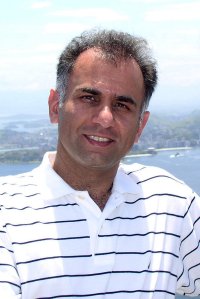EUGENE, Ore. — (Nov. 22, 2013) — Reza Rejaie, a professor in the University of Oregon Department of Computer and Information Science, has been awarded a $500,000 grant from the National Science Foundation to improve techniques for capturing a geography-aware view of Internet topology.
 The goal of the research — funded by the NSF's Computer and Network Systems: Core Programs — is to provide better analysis of real-world Internet problems such as those caused by natural disasters, economic disputes, malicious attacks, interdependencies and cascading failures.
The goal of the research — funded by the NSF's Computer and Network Systems: Core Programs — is to provide better analysis of real-world Internet problems such as those caused by natural disasters, economic disputes, malicious attacks, interdependencies and cascading failures.
The Internet is a network of networks, or autonomous systems, that are independently owned and managed, Rejaie says. Each network connects to other networks through one or more access points called PoPs, possibly at different geographic locations.
The three-year project, which started Oct. 1, involves large-scale measurements to determine the number and geographic locations of these interconnections for individual networks. This, in turn, will offer a more realistic view of how the Internet's tens of thousands of networks interconnect and enable scientists to investigate a wide range of problems.
"Prior research on Internet topology has been conducted at resolutions that are either too detailed to accurately capture Internet topology or too coarse to be useful in practice," Rejaie said. "The main goal of our research is to design, develop and rigorously evaluate measurement techniques that provide a more revealing view of Internet connectivity."
Titled "NeTS: Small: Towards an Accurate, Geo-Aware, PoP-Level Perspective of the Internet's Inter-AS Connectivity," the project is one of four active NSF grants being led by Rejaie, whose research has focused on peer-to-peer networks, multimedia networking, network measurement, congestion control, online social networks and content distribution networks. He directs the Oregon Network Research Group, where his team works on several research projects funded by the NSF, Cisco Systems and Thomson Research Labs.
In terms of the broader impact, Rejaie says that his latest project could lead to new collaborations and ultimately result in accurate Internet access point maps with geographic locations that have been vetted by numerous groups. The project is complemented by an education-and-outreach plan that includes the development of a new course and graduate level seminar, as well as the participation of undergraduate students and an outreach component involving K-12 students.
"Researchers at the University of Oregon continue to shape our information society by accelerating progress in computing, humanities, communications, marketing, arts, education, and physical, social and natural sciences," said Kimberly Andrews Espy, vice president for research and innovation and dean of the UO Graduate School. "This research by Dr. Rejaie and his team will help scientists to more effectively confront real-world Internet threats, and encourage future innovation."
Co-principal investigators on the grant (No. 1320977) are Walter Willinger with AT&T Labs and Bruce Maggs with the Department of Computer Science at Duke University.
About the University of Oregon
The University of Oregon is among the 108 institutions chosen from 4,633 U.S. universities for top-tier designation of "Very High Research Activity" in the 2010 Carnegie Classification of Institutions of Higher Education. The UO also is one of two Pacific Northwest members of the Association of American Universities.
Media Contact: Lewis Taylor, associate director of PR and strategic communications, 541-346-2816, lewist@uoregon.edu
Additional Links:
Like UO Science on Facebook: http://www.facebook.com/UniversityOfOregonScience
Follow UO Science on Twitter: https://twitter.com/UO_Research
Note: The University of Oregon is equipped with an on-campus television studio with a point-of-origin Vyvx connection, which provides broadcast-quality video to networks worldwide via fiber optic network. In addition, there is video access to satellite uplink, and audio access to an ISDN codec for broadcast-quality radio interviews.